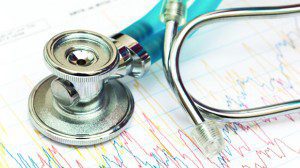 Stroke is the leading cause of adult disability and the number five cause of death in the United States. Nearly 800,000 Americans suffer a new or recurrent stroke each year. This means, on average, a stroke occurs about every forty seconds, and approximately every four minutes someone dies of stroke. With these statistics it is important that you know the warning signs of stroke and what to do if you, or someone you love, experiences any of the signs and symptoms of stroke.
Stroke is the leading cause of adult disability and the number five cause of death in the United States. Nearly 800,000 Americans suffer a new or recurrent stroke each year. This means, on average, a stroke occurs about every forty seconds, and approximately every four minutes someone dies of stroke. With these statistics it is important that you know the warning signs of stroke and what to do if you, or someone you love, experiences any of the signs and symptoms of stroke.
A stroke occurs when the blood supply to the brain is suddenly interrupted. When the brain lacks sufficient blood flow for a long enough period of time, brain damage or even death can result. Immediate medical attention and early treatment are critical to help minimize damage to brain tissue and improve the outcome.
There are two major types of strokes: ischemic and hemorrhagic. Ischemic stroke is the most common type, occurring when a blood clot blocks arteries and cuts off blood flow. Hemorrhagic stroke occurs when a blood vessel in part of the brain becomes weak and bursts open, causing blood to leak into the brain.
At the first sign of stroke, patients should seek medical care immediately. Symptoms of a stroke vary, but typically occur suddenly and include:
• Weakness, tingling or numbness in a limb
• Partial loss of vision
• Inability to move a limb
• Double vision, vertigo or loss of balance
• Difficulty swallowing
• Memory loss
• Drowsiness or loss of consciousness
• Uncontrollable eye movements
High blood pressure is the number one risk factor for strokes. Working closely with your doctor and making lifestyle changes can help decrease the risk of stroke including:
• Weight loss
• Quitting smoking
• Exercise
• Cholesterol and blood pressure management
• Reducing alcohol intake
Dr. Louis J. Scala and the team at Cardiac Care Group are on a mission to improve the health care of local communities. Cardiac Care Group provides comprehensive adult cardiology services that include noninvasive procedures and therapeutic interventions using state of the art diagnostic equipment. If you have any questions or concerns about the potential risks of stroke and your health, please contact our office. We are happy to provide you with invaluable information about your risks for stroke or other cardiac concerns. Call 239-574-8463 today.
THINK YOU ARE HAVING A STROKE?
CALL 9-1-1 IMMEDIATELY!
F.A.S.T. is an easy way to remember the sudden signs of stroke. When you can spot the signs, you’ll know that you need to call 9-1-1 for help right away. F.A.S.T. is:
F Face Drooping – Does one side of the face droop or is it numb? Ask the person to smile. Is the person’s smile uneven?
A Arm Weakness – Is one arm weak or numb? Ask the person to raise both arms. Does one arm drift downward?
S Speech Difficulty – Is speech slurred? Is the person unable to speak or hard to understand? Ask the person to repeat a simple sentence, like “The sky is blue.” Is the sentence repeated correctly?
T Time to call 9-1-1 – If someone shows any of these symptoms, even if the symptoms go away, call 9-1-1 and get the person to the hospital immediately. Check the time so you’ll know when the first symptoms appeared.
Dr. Scala has been selected a Castle Connolly 2015 “Top Doctor” by a physician-led team of researchers in the field of Cardiovascular Disease.
South Cape Business Center
3208 Chiquita Blvd. S, Suite 110
Cape Coral, FL 33914
(239) 574-8463
www.flccg.com
Our Cardiologist
Dr. Louis J. Scala has been voted TOP DOCTOR four consecutive years by Castle Connolly. He received his medical degree at the State University of New York Health Science Center. He completed his Residency at Brown University, and Cardiology Fellowship at Cedars-Sinai Medical Center at UCLA. He is Board Certified in Internal Medicine and specializes in Cardiovascular Disease.
Cardiac Care Group
(239) 574-8463
www.flccg.com










